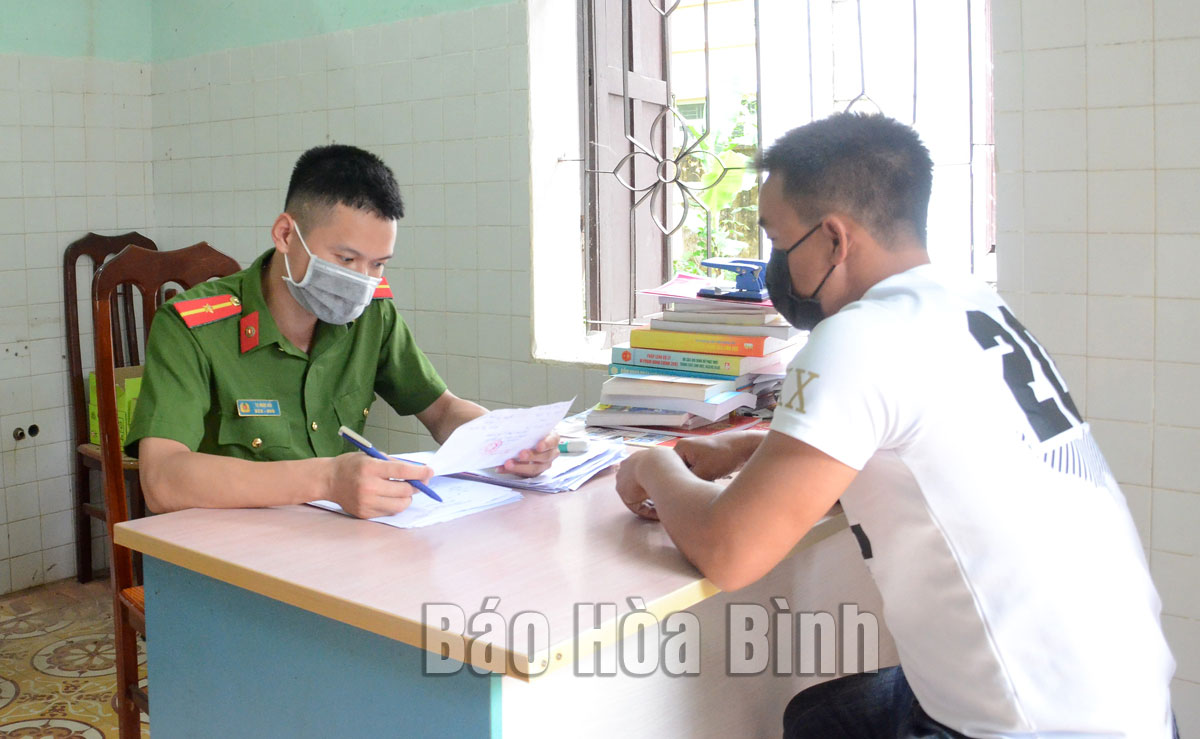
(HBO) – Managing activities in the field of information and communications, relevant agencies in Hoa Binh province have found some people taking advantage of the internet to spread wrong information and conduct sabotage.
Photo: A police officer of Luong Son district questions a man
who spread fake news about the local COVID-19 situation on social media.
Recently, authorities discovered Nguyen Van
Nghiem (born in 1963, living in Phuong Lam ward of Hoa Binh city) opening,
managing, and using many accounts on social media to post and share articles
and videos showing his personal viewpoints. They included 31 videos that
distorted and defamed the people’s administration, which stirred public concern
with anti-State purposes.
Meanwhile, Can Thi Theu and her sons, Trinh Ba
Tu (residing in Ngoc Luong commune of Yen Thuy district with her) and Trinh Ba
Phuong (residing in Hanoi’s Ha Dong district) used their personal Facebook
accounts to post many videos distorting and defaming the people’s
administration and disseminating fabrications.
Talking about this issue, Hoang Manh Cuong,
Deputy Director of the provincial Department of Information and Communications,
said information on the internet, especially social networks, are huge, easy to
access, and updated quickly. However, real information is currently mixed with
fake and unverified one, much of which incites internet users to engage in
violence and drives a wedge into the national solidarity.
Preliminary statistics show that there are more
than 150,000 social network accounts in Hoa Binh province at present, mostly on
Facebook, Zalo, and Youtube. Among them, many published posts about political
and social issues that included negative personal viewpoints and comments
running counter to the Party and State’s polices and laws. They also posted
video clips distorting and defaming leaders and the Party’s reform policy. A
number of such internet users have been detected, warned, and dealt with by
authorities.
Cuong noted to prevent the abuse of cyberspace
against the Party and State, the Department of Information and Communications
has advised the provincial People’s Committee about many counter-measures,
which have initially resulted in encouraging outcomes. In particular, it has
proposed the issuance of documents on managing, controlling, and orienting
information on social networks, managed the use of internet services and online
information, issued an implementation plan for a project on enhancing the
cybercrime combat, applied IT solutions to discover fake and hazardous
information, and carried out a project on the pilot establishment of an
integrated operations centre.
He added that all-level authorities, sectors,
media agencies, and the entire political system need to push ahead with
communications to raise public awareness of the Party and State’s policies and
laws on cybersecurity; strongly fight against the abuse of the internet, social
networks, and others on the internet to spread fake news or break laws; and
increase writings that disseminate information about positive and humane
deeds./.
Mai Chau district has firmly established itself as a standout destination on Vietnam’s tourism map, attracting both domestic and international visitors with its breathtaking landscapes, rich ethnic culture, and warm hospitality. However, beyond its natural and cultural charm, a secure and well-managed tourism environment has added to Mai Chau’s appeal.
As Vietnam enters a new phase of economic and administrative reform in 2025, Hoa Binh province is stepping up its efforts to streamline governance, boost economic growth, and attract investment.
The Hoa Binh provincial People's Committee held its monthly meeting on March 26 to review the progress of key projects, assess budget revenue and public investment disbursement, provide feedback on draft documents for submission to the provincial Party Committee's Standing Board, and discuss other important matters related to the committee's governance activities.
Playing a key role in Hoa Binh province’s economic development, Luong Son district has been focusing on science and technology development, innovation, and digital transformation.
Identifying the application of online public services as a key step in administrative procedure reform and e-government building, Kim Boi district has proactively provided services and supported residents and businesses in accessing and utilising full-process online public services promptly and efficiently. The locality aims to lift the rate of end-to-end online public services to over 90%, with all officials and civil servants handling tasks in the digital environment.
Nguyen Anh Tuyet, hailing from a family steeped in the ancient art of herbal medicine, is transforming local medicinal herbs into high-value concentrated extracts, elevating their worth and healing potential.



